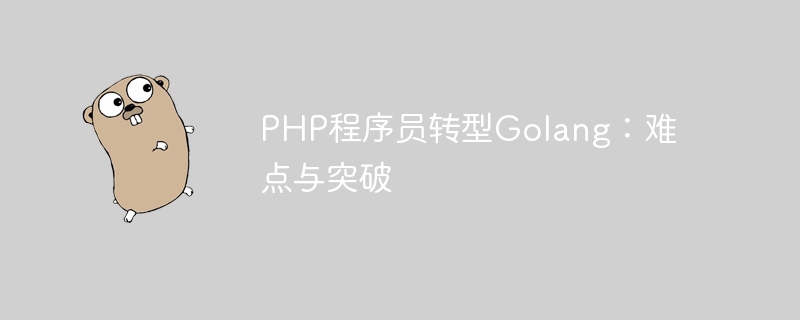Home >Backend Development >Golang >PHP programmers transform into Golang: difficulties and breakthroughs
PHP programmers transform into Golang: difficulties and breakthroughs
- WBOYWBOYWBOYWBOYWBOYWBOYWBOYWBOYWBOYWBOYWBOYWBOYWBOriginal
- 2024-03-06 22:15:04428browse

PHP programmers transform into Golang: Difficulties and breakthroughs, specific code examples are needed
With the continuous development and change of Internet technology, programmers also need to continue to learn and Adapt to new technologies and programming languages. In the field of programming, PHP and Golang are two common programming languages, each with its own characteristics and applicable scenarios. For a programmer who is used to writing code in PHP, the transformation to learning Golang may encounter some difficulties, but as long as you understand some key difficulties and make breakthroughs through specific code examples, the transformation process will become smoother and smoother. efficient.
1. Difficulty analysis
- Grammar differences: PHP and Golang are very different in syntax. For example, Golang is a strongly typed language and needs to specify variable types at compile time, while PHP is a dynamically typed language and can implicitly define variable types. For programmers who are accustomed to the dynamic characteristics of PHP, Golang's strong type definition may feel a bit unfamiliar.
- Concurrent programming: Golang considered the support of concurrent programming from the beginning of its design, and provided goroutine and channel at the language level to simplify concurrent operations. PHP is relatively cumbersome when dealing with concurrency and needs to rely on third-party libraries or extensions. This can be a challenge for programmers who are used to single-threaded programming in PHP.
- Package management and dependency management: Golang uses go module for package management, while PHP uses Composer. For PHP programmers who are used to Composer, it may take some time to understand and use go modules.
2. Break through Difficulties
- Learn Golang’s syntax: Start learning from the most basic syntax, and gradually master Golang’s type definition, function definition, control flow, etc. . By reading official documents, participating in online tutorials, and practicing project code, you will gradually become familiar with Golang's syntax features.
Specific code examples:
package main
import "fmt"
func main() {
var message string
message = "Hello, Golang!"
fmt.Println(message)
}- Understand concurrent programming: Master the basic concepts and techniques of concurrent programming by learning how to use goroutines and channels in Golang. By practicing examples such as multi-threaded tasks and concurrent communication, you can gain a deep understanding of the advantages and application scenarios of Golang concurrency.
Specific code examples:
package main
import (
"fmt"
"time"
)
func main() {
go say("Hello")
go say("Golang")
time.Sleep(time.Second)
}
func say(message string) {
for i := 0; i < 5; i++ {
fmt.Println(message)
time.Sleep(100 * time.Millisecond)
}
}- Use go module to manage project dependencies: learn how to use go mod, initialize the project and add dependencies, and learn how to update dependencies and resolve dependencies conflicts and other issues. By actually creating Golang projects and using go modules for package management, you will become familiar with the entire dependency management process.
Summary:
For a programmer who is used to PHP, the transition to learning Golang may face some difficulties, but through systematic learning and practice, these difficulties can be gradually overcome . Start with basic syntax and gradually learn more about concurrent programming and package management. Through specific code example exercises, you can accelerate learning and mastering Golang technology. The process of transforming and learning Golang may be challenging, but mastering new skills will open up a broader technical vision and improve your programming capabilities and competitiveness.
The above is the detailed content of PHP programmers transform into Golang: difficulties and breakthroughs. For more information, please follow other related articles on the PHP Chinese website!
Related articles
See more- Golang determines whether a character is a letter
- How to write database transactions in PHP
- Detailed explanation of the steps to use PHP to write Baidu speech synthesis API docking program
- How to write a simple online lending management system through PHP
- Meizu 21 Pro real machine exposed, original release plan changed, Meizu AI transformation arouses heated discussion

